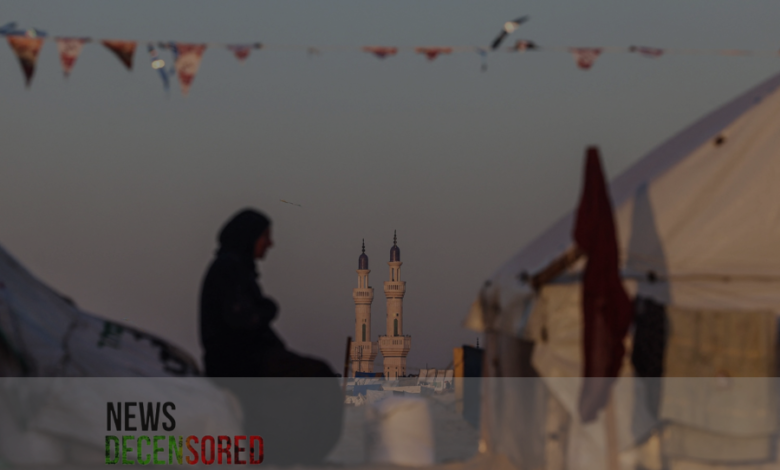Tent Mosque in Gaza: A Testament to Palestinian Women’s Resilience and Faith Amidst War

During a sweltering summer day in the Gaza Strip, several women and girls navigate through the streets filled with sewage and remnants of bombing. Their target is a tent mosque in Deir Al Balah, which represents the symbol of faith and resistance. These women are forced out of their homes, and all they have to turn to in these difficult times is the Quran.
This tent mosque became a symbol of hope when, on the 4th of June, six women successfully read the Quran without referring to the text. These extraordinary moments were captured in pictures by twenty-year-old Shaymaa Abualatta. “When the girls have finished reciting, we all wept and thanked God for this great boon,” one of the women, Summaa, remembered. ”I was touched by the fact that sometimes people cherished the Quran with their highest love, especially at this time. It was very special to me.
Before the war, Shayma did not socialize beyond going to university, her neighborhood, and her family; she was a third-year computer engineering student at the Islamic University of Gaza.
However, the conflict is supposed to support her change the whole perspective of her life. Her family house in Shejaia, one of the most prominent neighborhoods in the Gaza Strip, was targeted and demolished by the Israeli forces, leaving her family with nothing but the clothes on their backs with one bag allowed to flee.
They have been displaced several times over, and the violent events that Shaymaa described, she has been close to dying during the airstrikes three times.
Forced to move to Deir Al Balah, Shaymaa said they lived in overcrowded tents that offered no protection from heat, flash floods, and waterborne diseases or a steady supply of clean water and electricity. In this context, they tried to restore order to their lives as before the event or disaster they had opted to solve. “This is our normal, where air strikes bombard homes, bombs explode, and our focus is on grieving our dear ones,” said Shaymaa. Seven out of her flesh and blood died: two grandparents, three cousins, and two uncles.
Yearning to leave their stagnant lives, ignorance, and death, seeking their normality, Shaymaa and the other camp girls returned to the importance of education and religious learning. Nevertheless, the Quran, which provided us with a lot of strength, was something we had to return to, she continues.
They all used to sit in Shaymaa’s tent; however, as more people joined them for the Quran study circle or halaqa, they needed to find a more spacious location. Therefore, it was proposed that a mosque should be made like a tent with partitioning.
Khadija, Shaymaa’s aunt and Quran teacher, tried to get the necessary funds from different organizations; by the end of February, they had created the “Prayer Tent for the Circle of the Good Word,” a temporary structure for prayers and the Quran circle. This teaching facility is a tented mosque for both men and women. The worships for women are held on Tuesdays and Thursdays, with about one hundred female students in attendance.
As Shaymaa points out, ‘There were people who had initiated their journey of memorization of the Quran; however, many others began this process during the war. ’ Daily, they live with a death awareness, and to meet Allah, they memorize the Quran and intend to be with Allah with the memorized Quran in their hearts. Surviving women turn to this way because it is believed that their recitation brings a reward to their deceased family members.
The reading of the Quran in the tent mosque is a daily practice that includes reading the Quran in a single sitting once a month. The six women, including Iman Asem, 34 years old and holding an Islamic Law degree, read the Quran continuously in one sitting.
Having been forcibly evicted from her home area in the North of Gaza, she was relocated to Abu Ammar al Zowaida camp, where the tent mosque is situated. Still, the living environment continues to be poor, and Iman is grateful for having a shelter that functions as a mosque. For this reason, Aga says that God has provided them with a tent mosque, which is a provision to have some sort of a place of prayer in a displacement camp, even though it may be in a tent.
A tent mosque has recently become sacred for high school students Afnan Heles and 29-year-old Aya Qalaja. Afnan, a schoolgirl from Gaza City, is now busy in the mosque, made from tents, memorizing and teaching the Quran to other children. Yes, this is evidenced by that Aya, having memorized the Quran twice, needs the tent mosque to revise before memorizing again.
Teacher Khadija always encourages them, urging them to recite the prayers sincerely and asking them to pray for their pain to end. Shaymaa sums up that by making ourselves closer to the Quran and memorizing it as much as possible, we will be closer to stopping the war and suffering, Inshallah. ”




